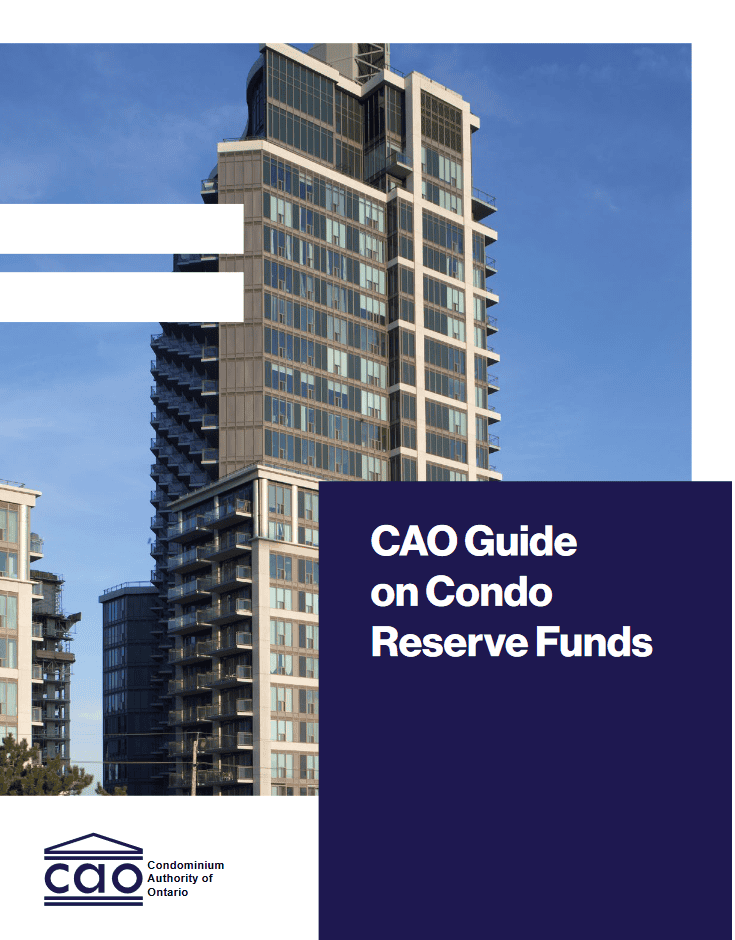GUIDE
CAO Guide on Condo Reserve Funds
Need to understand what reserve funds are? Our in-depth guide will outline what they are and best practices for managing them. Reserve funds are critically important for the long-term well-being of condominiums in the province.
The Condominium Authority of Ontario understands the tremendous responsibility of each condo board when it comes to ensuring an adequate reserve fund is maintained for their corporation. That’s why we developed this comprehensive guide for owners and directors who want to understand what’s involved and steps they can take to meet this critical responsibility.
What is a Reserve Fund
The reserve fund is a dedicated mandatory account that condo corporations use to pay for major repairs and replacements of common elements and assets. It’s like a savings account that a condo owner might use for both emergency and planned repairs. The reserve fund may not be used for alterations or improvements.
Outcomes of Good Reserve Fund Planning
- Reduces potential for special assessments and debt
- Maintains the condo’s structural integrity
- Maintains unit and property values
- Enables the corporation to address repairs quickly
Reserve Fund Studies
Everything begins with commissioning the first Reserve Fund Study. Condo Corporations must have qualified experts complete this study. Thereafter, reserve fund studies are conducted periodically by qualified experts to establish and update their cost estimates based on the current state of physical components. There are three types of studies:
- Class 1: Comprehensive and done within a year of the condo corporation’s registration.
- Class 2: An updated study with a site inspection done three years or less after class 3.
- Class 3: An updated study without a site inspection done three years or less after class 1 and 2.
Other Reserve Fund-Related Documents
Key documents related to reserve funds include:
- Audited Financial Statements: Annual audit of the condo corporation’s finances, including reserve fund finances.
- Periodic Information Certificates: Sent at least twice a year and include updates for owners on the reserve fund balance and contributions.
- Status Certificates: Provide buyers with information on the unit and condo corporation, including details on the reserve fund and any special assessments.
Reserve Fund Best Practices
There is no one-side-fits-all approach to reserve funds and reserve fund studies, though we can use some tools to help ensure a healthy reserve fund. Here are some tips:
1. Finding and retaining the right RFS provider for your corporation: Get recommendations and interview multiple candidates.
Condo boards are encouraged to ask their condo manager or directors of other boards for referrals. They should also review their governing documents (declaration, by-laws, rules) for any procurement practices and procedures. In addition to any requirements in the governing documents, a best practice would be to entertain bids and have interviews with at least three RFS providers as part of the procurement process.
2. Gather relevant documents: Gather relevant financial and legal documents ahead of time.
They include your corporation’s governing documents, previous reserve fund studies, financial records, shared facilities agreements, EV charging systems installation agreements, agreements to modify common elements, etc.
Seek legal advice if necessary.
3. Clarifying repair and maintenance obligations: Ensure all parties know who is responsible for repairs.
Condo corporations are generally responsible for repairing the common elements after damage, but the declaration may specify that owners are responsible for repairing parts of the common elements that are exclusive to their unit. Lack of clarity about repair obligations, including obligations to repair exclusive use common elements, may result in an over or under estimation of repair costs because something that was deemed to be the repair responsibility of an owner may be misattributed to the corporation or vice versa.
4. Participate actively in the RFS process: Boards should be involved and proactive.
Boards have important knowledge about the corporation’s common elements and the community’s concerns that they should actively share with providers so that nothing is overlooked. The RFS provider’s expertise can complement this information so that the community can achieve the best results. Condo managers can be heavily involved throughout the RFS process as well, but this will depend on the management agreement. However, a best practice is for boards to be actively involved in the RFS process and to provide input to the RFS provider.
5. Consider risk factors: Plan for high-risk components like balconies or parking structures.
Costs and timelines of likely repairs and replacements are determined by the age and type of the corporation’s components. Some components may pose higher financial and safety risks if they are not properly maintained.
Some examples of risk factors include the following:
- Having four or more stories in height
- Suspended structural slabs that support parking, driveways, or landscaping
- Post-tensioned structures
- Buildings with balconies that are fully exposed.
